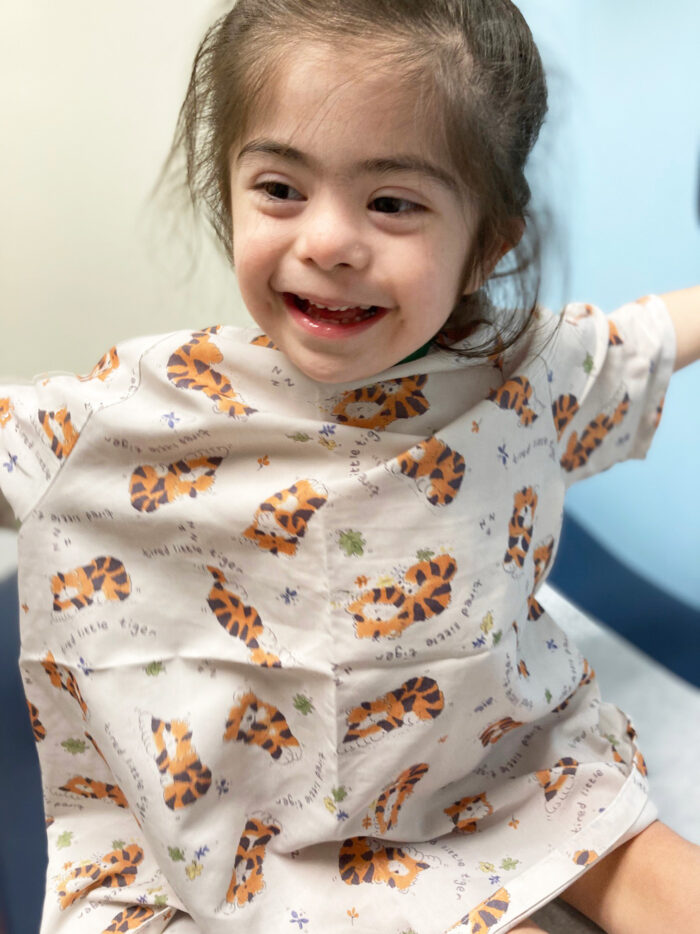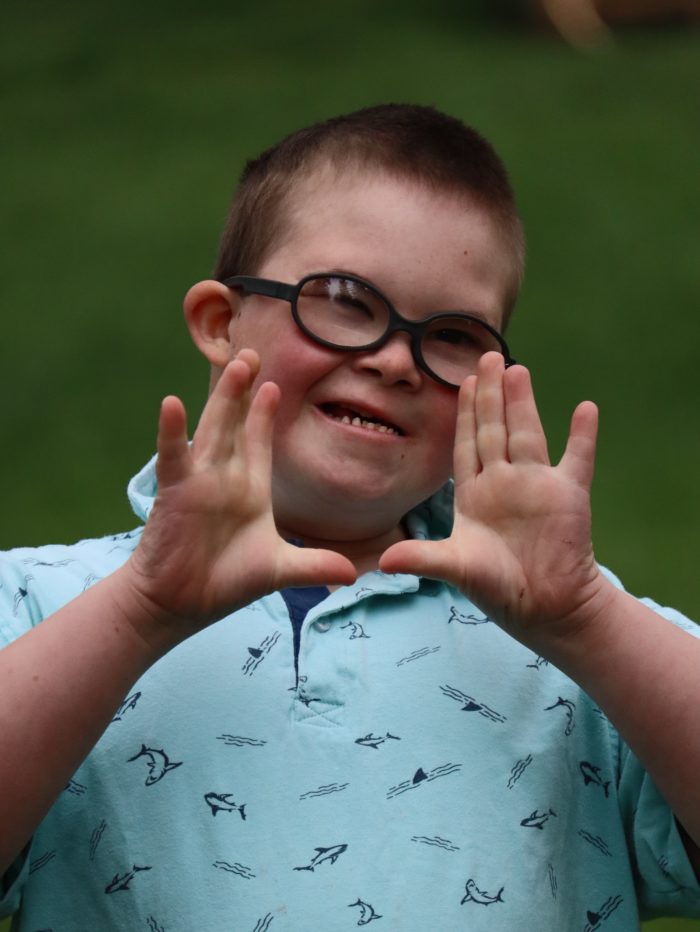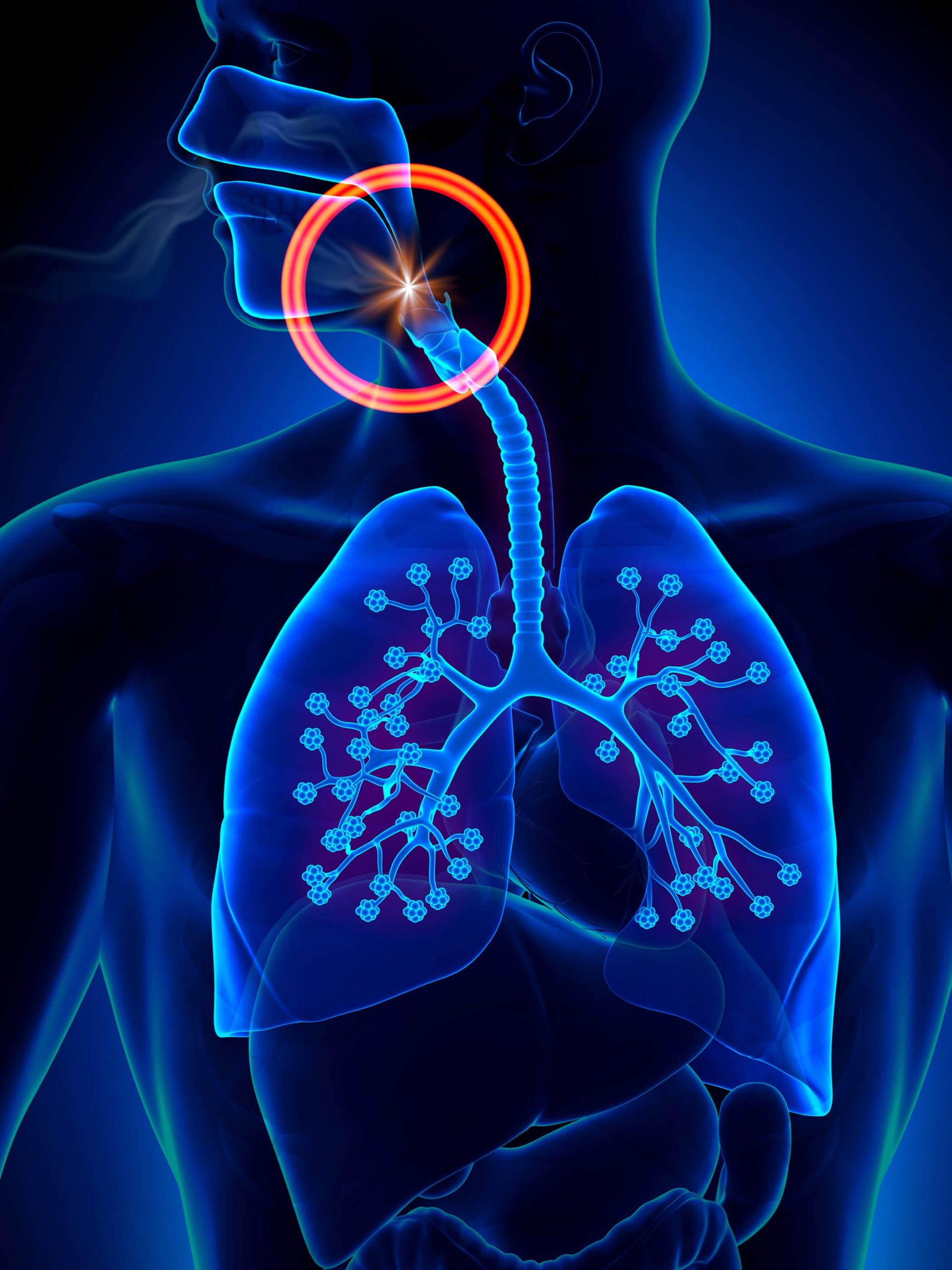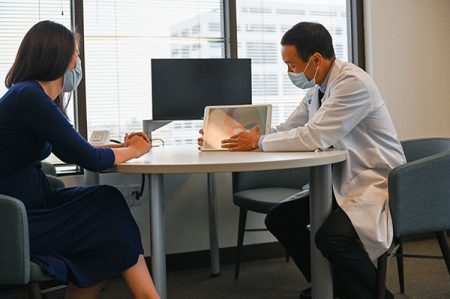Children with Down syndrome have unique health care and developmental concerns that often require integrated services from a multitude of health care, social, and educational services. The CHOC Down Syndrome Program is a community-based clinic bridging community services and clinical specialists in Down syndrome to help ensure that these needs are being met.
The clinic is not designed to replace the services of the primary care physician but rather to complement these services by providing supplementary medical care with an emphasis on preventive medicine and case management services.
By collaborating with primary care physicians, Down syndrome specialists and community-based support services we will help patients reach their potential and optimal health and development.
CHOC Down Syndrome Program is an alliance with the Down Syndrome Association of Orange County. Learn more about the DSA of Orange County.
What is Down syndrome?
Down syndrome is a genetic disorder that occurs when a person has a partial or complete third copy of chromosome 21. Down syndrome causes involve birth defects, intellectual disabilities, and characteristic facial features. It also often involves heart defects, visual and hearing impairments, and other health problems. The severity of these health problems varies greatly. Down syndrome is one of the most common genetic birth defects, affecting about one in 800 babies. In the United States, around 250,000 individuals have Down syndrome. The term Down syndrome comes from Dr. Langdon Down, the doctor who first described the collection of physical symptoms in 1866. It was not until 1959 that the cause of Down syndrome (the presence of an extra #21 chromosome) was identified.
What causes Down syndrome?
Normally in reproduction, the egg cell of the mother and the sperm cell of the father start out with the usual number of 46 chromosomes. The egg and sperm cells both undergo a cell division in which the 46 chromosomes are divided in half, so that both the egg and the sperm cells will have 23 chromosomes each. When a sperm with 23 chromosomes fertilizes an egg with 23 chromosomes, the baby will have a complete set of 46 chromosomes, half from the father and half from the mother.
Sometimes, an error occurs when the 46 chromosomes are being divided in half, and an egg or sperm cell keeps both copies of the #21 chromosome instead of just one copy. If this egg or sperm is fertilized, then the baby will have three copies of the #21 chromosome, which is called trisomy 21, or Down syndrome. The features of Down syndrome are caused by that extra copy of chromosome #21 being in every cell in the body.
Most cases of Down syndrome are caused by trisomy 21. Occasionally, the extra chromosome #21 or a portion of it is attached to another chromosome in the egg or sperm; this may cause “translocation Down syndrome.” This is the only form of Down syndrome that may be inherited from a parent. Some parents have a rearrangement called a balanced translocation, in which the #21 chromosome is attached to another chromosome, but it does not affect their own health. Rarely, another form called “mosaic Down syndrome” may occur when an error in cell division happens after fertilization. These individuals have some cells with an extra chromosome #21 (47 chromosomes total), and other cells have the usual number (46 total).
How is Down syndrome diagnosed?
Since Down syndrome has such a unique group of characteristics, physicians can sometimes determine whether a baby has Down syndrome simply by physical examination. To confirm the physical findings, a small blood sample can be taken, and the chromosomes can be analyzed to determine the presence of extra #21 chromosome material. This information is important in determining the risk in future pregnancies. (Translocation Down syndrome and mosaic Down syndrome have different recurrence risks in future pregnancies).
Chromosomal abnormalities such as Down syndrome can often be diagnosed before birth by analyzing cells in the amniotic fluid or from the placenta. Fetal ultrasound during pregnancy can also give information about the possibility of Down syndrome, but ultrasound is not 100 percent accurate because many babies with Down syndrome look the same on ultrasound as those without Down syndrome. A chromosome analysis, whether performed on a blood sample, cells from the amniotic fluid, or placenta, is very accurate.
Down syndrome life expectancy
Life expectancy among adults with Down syndrome is about 60 years, though average lifespan varies.
Down syndrome risks
The mother’s age at delivery is the only factor found to be linked to the risk of having a baby with Down syndrome. This risk increases with every year, especially after the mother is 35 years old. However, because younger women are more likely to have babies than older women, most babies with Down syndrome are born to women younger than 35. The American College of Obstetricians and Gynecologists recommends that all pregnant women, regardless of age, be offered screening for Down syndrome.
In general, for women who have had one child with Down syndrome, the chance of having another baby with Down syndrome depends on several factors, such as the mother’s age. It is important to know that most babies with Down syndrome are born to women under 35. This is because women under 35 have more babies than women over 35. Your physician may refer you to a geneticist or genetic counselor who can explain the results of chromosomal tests in detail, including what the recurrence risks may be in another pregnancy, and what tests are available to diagnose before a baby is born. .
Down syndrome and other health problems
About half of babies with Down syndrome have heart defects. Some defects are minor and may be treated with medications, while others may require surgery. All babies with Down syndrome should be examined by a pediatric cardiologist. This is a doctor who specializes in heart diseases of children. Babies with Down syndrome should also have an echocardiogram. This is a procedure that evaluates the structure and function of the heart by using sound waves recorded on an electronic sensor that produce a moving picture of the heart and heart valves. This exam and test should be done in the first two months of life, so that any heart defects can be treated.
- Some babies with Down syndrome are born with intestinal malformations that require surgery.
- Children with Down syndrome are at increased risk for visual impairment. Common visual impairments include crossed eyes, near- or farsightedness, and cataracts. Most visual impairments can be improved with glasses, surgery, or other treatments. A pediatric ophthalmologist should be consulted within the first year of life. This is a doctor who specializes in comprehensive eye care and provides examinations, diagnosis, and treatment for a variety of eye disorders.
- Children with Down syndrome may have hearing loss because of fluid in the middle ear, a nerve defect, or both. All children with Down syndrome should have regular vision and hearing examinations so any problems can be treated before they hinder development of language and other skills.
- Children with Down syndrome are at increased risk for thyroid problems and leukemia. They also tend to have many colds, as well as bronchitis and pneumonia. Children with Down syndrome should receive regular medical care, including childhood immunizations.
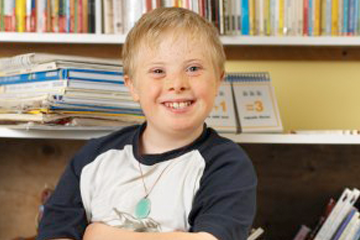 Comprehensive medical assessment of children with Down syndrome from birth to age 18
Comprehensive medical assessment of children with Down syndrome from birth to age 18